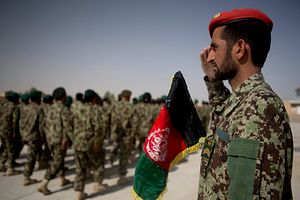With Afghan officials finally resuming peace talks with the Taliban, there are new figures facilitating the deal. In the last effort, which stagnated in 2013, the United States and India, a key ally of then-President Hamid Karzai, facilitated the talks. Today, with Ashraf Ghani in office, it increasingly looks like Washington and Delhi will take a backseat to Pakistan and China.
The negotiations will be a test of political will for all involved. China, which fears getting too deeply enmeshed in the dangerous country, will have to figure out how to protect its contractors. Pakistan, in sidelining India, could jeopardize shuttle diplomacy efforts that began during the Cricket World Cup in March. Afghanistan again risks becoming a political pawn in a much larger game, particularly with China becoming more and more involved in the booming region: promising a new silk road that would link the eastern and central Asia.
The talks are only beginning. Ghani just returned from Washington, where he successfully persuaded the Americans to continue their involvement in the region, just as the summer fighting season heats up in Helmand and Kandahar. At a press conference last week, Defense Secretary Ashton Carter, Secretary of State John Kerry, and Treasury Secretary Jacob Lew announced, with Ghani in tow, that they would continue training and equipping the Afghan National Security Forces (ANSF) into 2017.
Pakistan’s role in the talks could invite skepticism. Benazir Bhutto was accused of stoking the young Taliban insurgency as prime minister in the 1990s — all with the intent to support an oil pipeline through Central Asia and across Afghanistan. But with Afghanistan’s relationship with Islamabad growing closer ever since Ghani came to power in August, Kabul seems to welcome a greater Pakistani role in the talks. “It’s one of those things where we’ll play this game again, and we’ll see what happens, and if the Pakistanis stick to their word, then great, and if not, we’ll try something else,” Daniel Markey, a senior adjunct fellow for India, Pakistan, and South Asia at the Council on Foreign Relations, notes. “But unlike Karzai, he’s willing to play that game, which is different.”
For China, there are huge economic incentives for engaging in Afghanistan, especially critical copper and mineral deposits. China has promised to build a 1,500 megawatt dam on the Kunar River, one of the most violent sites in Afghanistan, and hopes to be active in facilitating the construction of road and rail links around the region. That will start with a planned motorway that will link Peshawar and Kabul, as well as a rail line from Chaman to Kandahar. “For a long time, China has been seen as a unique and potential partner in all of this, but a reluctant and unwilling one,” Markey says. “What’s changed is their desire to play a more active role.”
Geopolitics also play a role. Both China and Pakistan could attempt to dislodge India by taking a greater foothold in the country. China also remains concerned about keeping its western provinces, like Xinjiang, where the Muslim Uighur minority has clashed with the government, out of contact with Taliban.
All of this assumes that the Taliban will be a willing partner. That’s not a given. There will be a tough summer of fighting ahead, the first that the ANSF will take on largely by itself, with just 9,800 Americans left to carry on the fight. Will that push be enough? Even with the Chinese and Pakistanis at the table, reconciliation won’t be easily won.

































